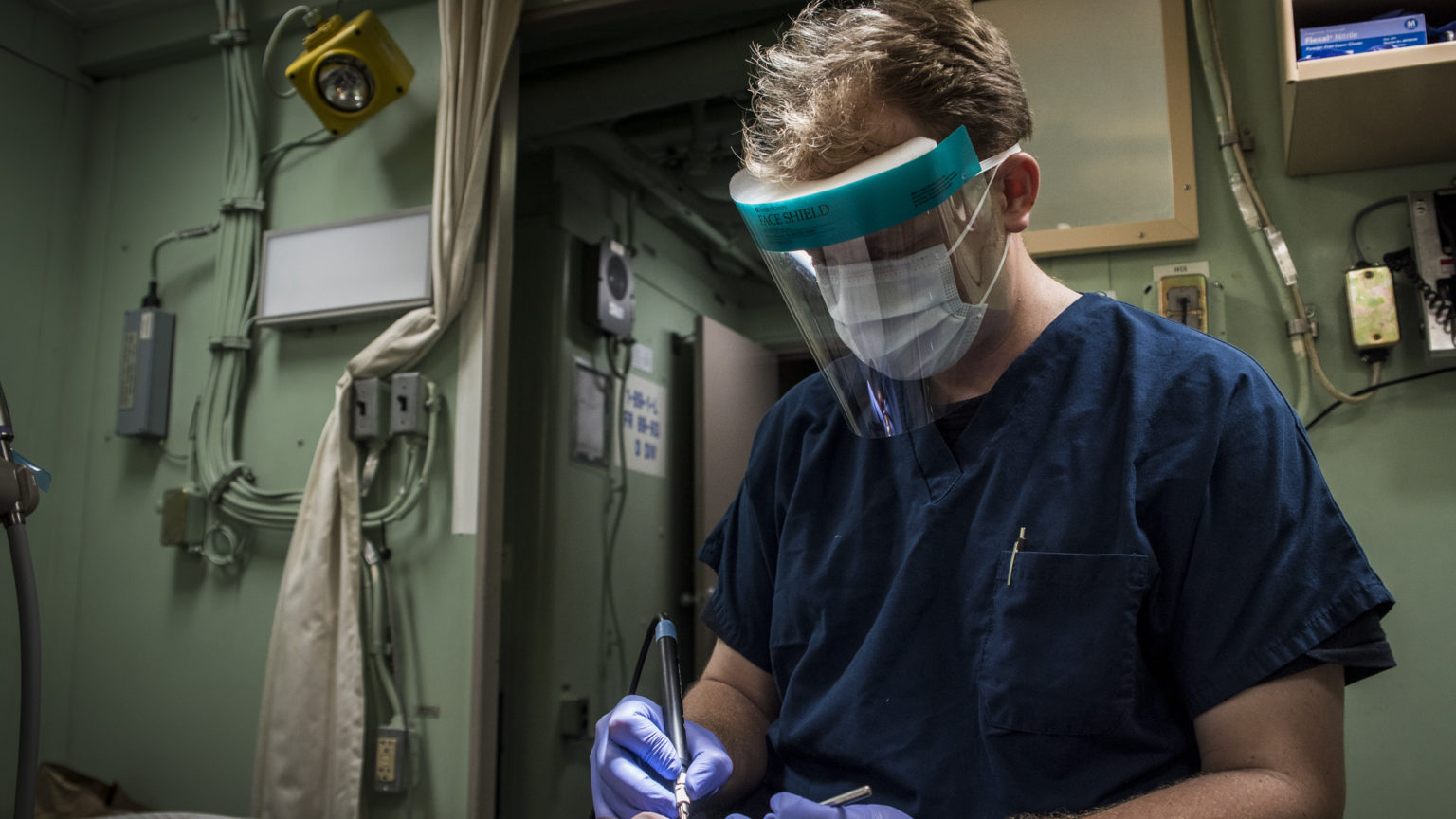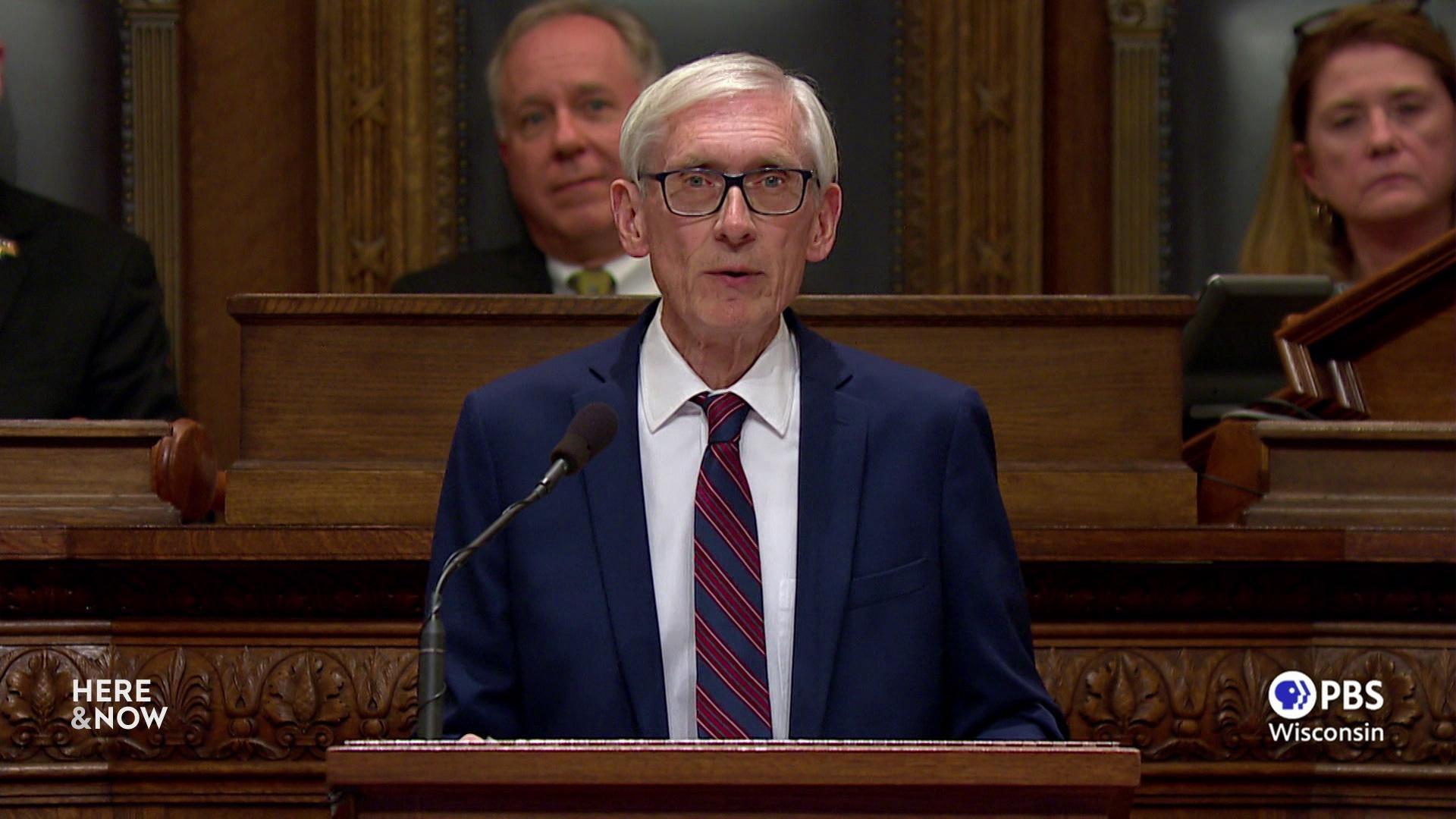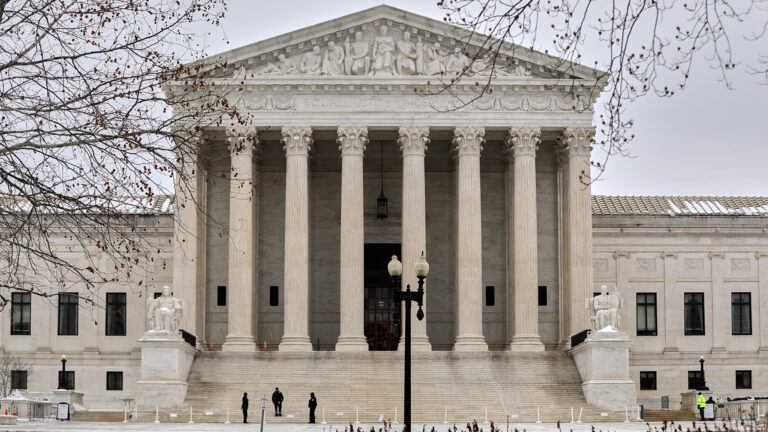Industry Steps Up But Far from Scale Needed
By Andy Soth
March 25, 2020 • Southeast Region

A U.S. Navy officer wears a medical face shield during a teeth cleaning. (Courtesty: U.S. Naval Forces Central Command/U.S. Fifth Fleet)
Necessity being the mother of invention, Justin Webb, CEO of Franzen Graphics in Sheboygan, saw a need and with his colleagues invented a simple solution. The company specializes in printing on plastic for items like in-store displays and saw a new application for the material they usually print on.
Now 30% of their production output is dedicated to making face shields for personal protection use by medical staff, with Webb predicting it could increase to 50% or even 70%.

Franzen Graphics is adding production of plastic face shields to their production output.
“The conversion for us to take a plastic sheet and use our machines to cut the design–it’s basically what we do all day long,” Webb said.
Conversion of existing manufacturing facilities to make supplies needed in the COVID-19 crisis has been getting a great deal of attention. Numerous distilleries have gotten into the spirit by turning from hard liquor to hand sanitizer. A Wisconsin company that sews flags has turned its patriotic expression to making face masks for hospitals and clinics for patient use to prevent the spread of infection through sneezes and coughs.
While these small businesses do what they can, large industry retooling to make what is needed is much more complicated.
“It is costly and time-consuming to switch from producing automobile parts, for example, to making ventilators,” UW-Madison economist Ian Coxhead stated in an email interview.
Ford announced a partnership Tuesday with 3M and GE Medical to make ventilators and other equipment. The president expressed confidence in the auto industry taking the wheel. He tweeted on Sunday, “Ford, General Motors and Tesla are being given the go ahead to make ventilators and other metal products, FAST. Go for it auto execs, lets see how good you are?”
Despite the Ford announcement, overall progress has been slow. Coxhead describes the situation as a stalemate between government and business: “Mr. Trump and other administration officials have stated that they are reluctant to use compulsion to increase production. Nor have they articulated a clear plan to request supplies from industry and to reward them for doing so.”
Employing compulsion to increase production comes from powers granted the president by the Defense Protection Act (DPA) of 1950. While President Donald Trump signed an executive order invoking the act on March 18, his administration has been hesitant to make government mandates. During Sunday’s press briefing the president said, “We’re a country not based on nationalizing our business.”

President Donald J. Trump, joined by Vice President Mike Pence and members of the White House Coronavirus Task Force, meets with reporters at a coronavirus (COVID-19) update briefing Monday, March 23, 2020, in the James S. Brady Press Briefing Room of the White House. (Courtesy: Shealah Craighead / The White House)
Democratic Wisconsin U.S. Sen. Tammy Baldwin is trying to use the compulsion available to her as a legislator to make the administration use the act’s full powers. Baldwin has drafted a bill to require the administration to assess needs, identify industries that can meet demand, and expedite procurement.
“The DPA can help get the industrial base to manufacture what we need ASAP, instead of relying on voluntary production,” Baldwin’s office commented.
Industrial adaptation to meet the medical supply needs brought on by the coronavirus will take time, whether it’s voluntary or compulsory. Economist Coxhead notes, “While there will be a lag before production comes on stream, the current trajectory of the pandemic in America indicates that we will still face huge excess demand for medical equipment and supplies some months from today.”
With Wisconsin’s strong manufacturing capacity, opportunities for industry to help fight the virus could be plentiful. That might provide a small glimmer of hope as the economy heads into recession.
Baldwin sees employing the powers of the Defense Protection Act as a vital step in that direction. The senator’s office stated, “Our manufacturing base could step up production with purchase orders through the DPA so Wisconsin could contribute in many ways to meet the need.”
When asked if a large government order would lead Franzen Graphics to increase capacity and invest in more production equipment for its Sheboygan plant, Justin Webb replied, “One hundred percent, one hundred percent.”
Webb credits involvement from the governor’s office and state Rep. Evan Goyke, D-Milwaukee, for helping in their efforts, especially with the designation of his company as a vital business that can stay in operation during the widespread shutdown that began Wednesday.
“They were honestly instrumental in breaking down the barriers in terms of how we can start to produce this to help our frontline people fight coronavirus,” Webb said. The small business owner added this thought that all sides could agree on, “I just want to get business back to normal as fast as possible.”
 Passport
Passport











Follow Us